________________
ACTIVITY AND ITS CONTROL
155
received. There are in all forty-six faults to be avoided in this respect. We need not enumerate them here. The only point we want to emphasise is that for the control and regulation of activities, all possible faults as regards receiving of things should be avoided.
With regard to keeping of things, a well-disciplined person should wipe a particular article after having inspected it with his own eyes, and then he should take it up or put it down with complete carefulness.?
Regarding the performance of excretional activities, a welldisciplined person should act in the following manner: Excrements, urine, saliva, mucus, uncleanliness of the body, offals of food, waste things, and everything of this kind is to be disposed of in a place neither frequented nor seen by other people, which creates no trouble
elf-control, which is not odd, which is not covered with grass or leaves, not having holes, which has an inanimate surface-layer, which is not too near a village, etc., which is exempt from insects and the like. These are the five aspects of self-regulation (samiti) corresponding to the five chief activities performed for the maintenance of life. Let us have a comparative and critical estimate thereof. . The whole code of self-regulation is inspired by the great Jaina
principle of non-violence. Violence is not confined to physical slaying only. All possible types of injury whether it be mental, vocal, or physical are included in violence. This being the reason, a welldisciplined person is prohibited against making unwarranted assertions or negations. He is required to be very careful about his speech. He should not joke, nor should he make any categorical assertions. Similarly, he is required to be careful about walking, receiving, and the like. He should not hurt even the feelings of others. Anger, pride, deceit, and greed are his real enemies. He should destroy them and not any other living being. He should, therefore, desist from killing others. He should restrain himself. He can, thus, be free from all anger, pride, deceit, and greed, and ultimately he is freed from all karma which is the sole cause of suffering. The conception of yama of Yoga can be compared with the Jaina con
1 Gavesanāe gahane ya paribhogesaņā......
Uttarādhyayana-sūtra, XXIV, 11-2. 2 Ibid., XXIV, 14. 3 Ibid., XXIV, 15-8.




